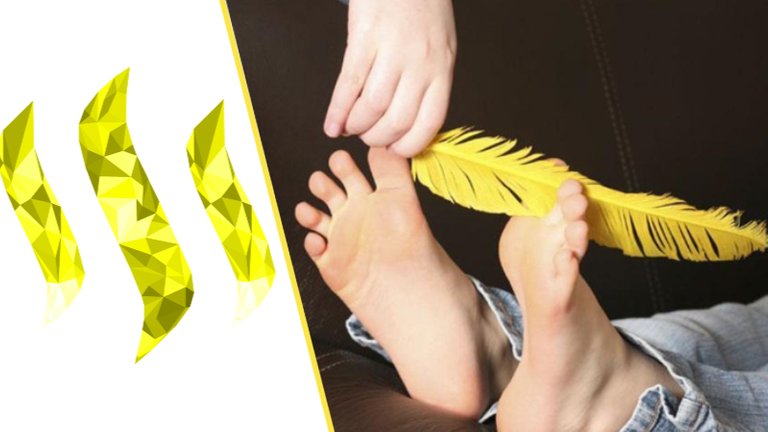
Tickling is probably the nicest variation of torture! Everyone who has siblings (or annoying friends) has probably had to overcome a few tickle-attacks in their life.
We start to laugh uncontrollbly, we curl together in a ball, and most of the time we can't stop our 'opponent' from tickling us!
Although we laugh, tickling is not actually a very pleasant feeling.
So why exactly are we ticklish - what's the purpose? And why is it impossible to tickle ourselves ?!
What is the sensation of being ticklish?
Scientifically, tickling combines 2 different aspects: Knismesis and Gargalesis.
Knismesis describes the sensation of something slightly burshing your skin - for example a feather, or a bug. Instinctively, we brush it away and react defensively, because we don't know what that sensation is or where it comes from.
Gargalesis on the other hand is the 'classical' type of tickling where we suddenly start to laugh.
Interestingly, this type of tickling only works on humans and primates.

What is the connection between laughing and tickling?
Researchers at the University of Tübingen in Germany conducted a study in 2013, to test if the laugh from a joke and the laugh from tickling is the same.
They measured the brain activity of the subjects both when being tickled, and when they laughed voluntarily.
In both cases, the rolandic operculum was stimulated - the part of our brain that controls facial movements, and also vocal-emotional reactions. But there was a significant difference:
When the subjects were being tickled, their Hypothalamus was stimulated as well. This is the part of the brain that gets activated for all instinctive actions, as well as anticipating pain.
So this might be the reason why we react so defensively, and sometimes almost scared, when we're being tickled.

What's the purpose of tickling?
Scientists don't have a clear answer to this question yet.
But the most popular theory suggests that tickling is a way of learning to defend ourselves, without a serious threat - similar to playfighting in animals.
We are mostly ticklish in our weak spots - under the arms, around the neck, and the stomach area - parts of our body that aren't protected very well.
So researchers suggest that when parents tickle their kids, they actually playfully teach them where their weak spots are, and how they can/should defend themselves.
And laughing is actually a very important part of this process: Laughing and smiling is a positive reaction, which signals the "tickler" to keep going. If tickling resulted in a negative emotional response, wouldn't do it, and therefore not teach others how to defend themselves.
Other theories suggest that tickling is a form of social bonding between family members, and members of a friendship group.
Why can't we tickle ourselves?
If you've ever tried to tickle yourself, you'll know that it's basically impossible.
This is due to a part of our brain called the cerebellum.
The cerebellum monitors the (unexpected) sensory input on our body and environment.
So when someone is trying to tickle us, it's an unexpected sensation, an the cerebellum will signal the rest of the body that it should go into alarm mode, because the sensation might be a possible threat.
But when we try to tickle ourselves, our cerebellum already has an idea where you will tickle yourself and how that will feel - so it signals to suppress the normal tickle response, basically informing your body that your own fingers are no threat.
Interestingly, people with schizophrenia can actually tickle themselves: Their brains have structural variatons, that affect the function o the cerebellum. Their brain doesn't send out the signal that the tickle comes from their own hands, therefore the tickle response gets executed as if someone else was tickling them.

Images: Logo, 1, 2, 3, 4, Sources: 1, 2, 3, 4
- Instagram -

Sirwinchester
This post has been ranked within the top 10 most undervalued posts in the second half of Dec 28. We estimate that this post is undervalued by $43.41 as compared to a scenario in which every voter had an equal say.
See the full rankings and details in The Daily Tribune: Dec 28 - Part II. You can also read about some of our methodology, data analysis and technical details in our initial post.
If you are the author and would prefer not to receive these comments, simply reply "Stop" to this comment.
Everyone with siblings knows: Tickle wars are the WORST!
Hahaha, definitely! Tickling among siblings is no joke
Interesting! I've actually wondered about the purpose of tickling before. It just seemed like it has no real evolutionary reason
The real reason still remains a mystery, even the theories mentioned above are just suggestions!
Who here got tickled till they peed there pants? Then did the same thing to new kids?
Hahaha, kids can be so cruel!